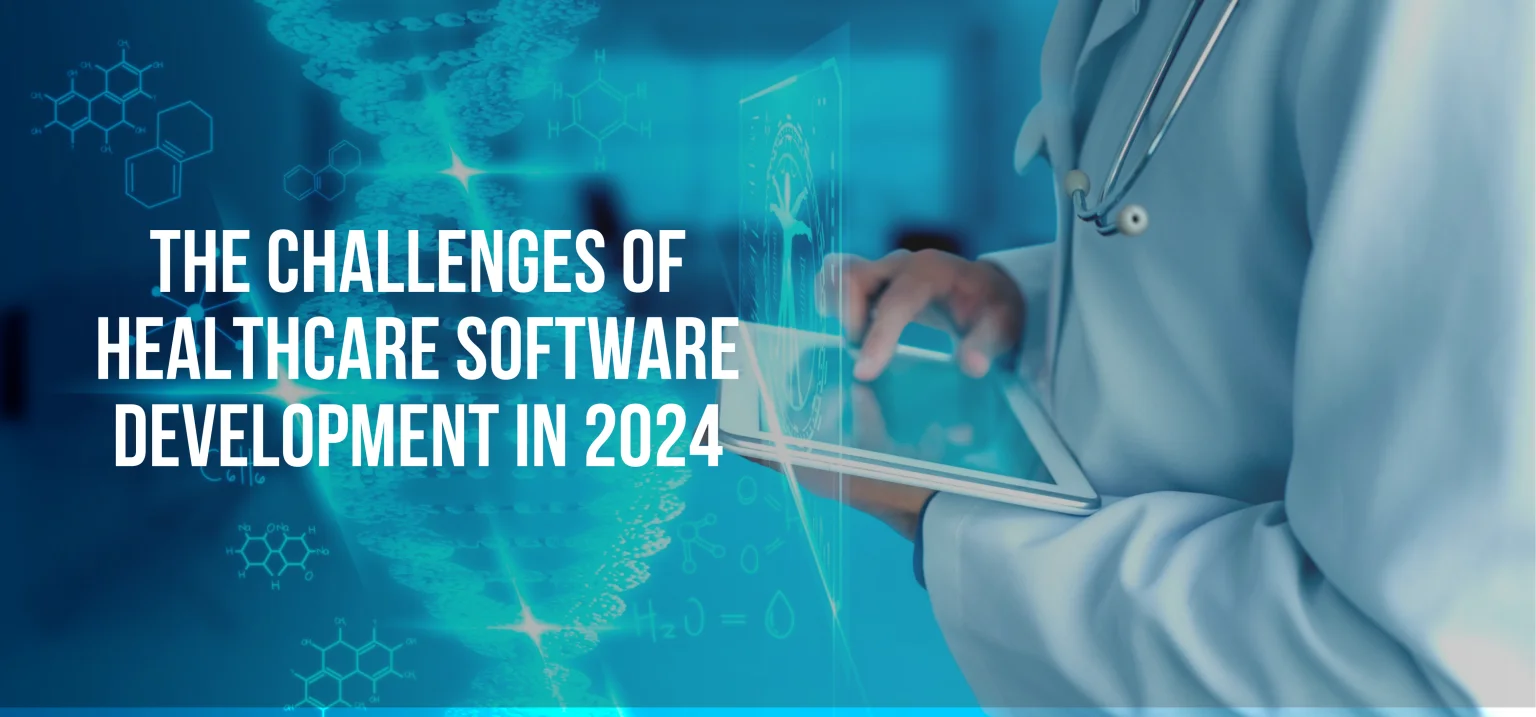The advent of technology has brought about a remarkable revolution in the healthcare sector. In just a few decades, a lot has happened in the healthcare industry, whether it be through software that simplifies workflow or medical equipment that supports treatments. As always, by 2024, new technologies, a stronger emphasis on enhancing patient care and efficiency in operations, and a higher priority on data security will drive a revolution in healthcare software. The blending of technologies that will revolutionize healthcare delivery is reflected in the top crucial developments in healthcare software development. These trends, which include the application of blockchain technology and artificial intelligence, the growth of telehealth solutions, and the emphasis on interoperability, show how adaptable and dynamic this sector is to shifting demands.
Has the journey been easy, though? The healthcare industry is well known for its slow adoption of new technologies. This makes sense because there are a lot of obstacles to overcome. The healthcare sector’s unique characteristics make it impossible to prioritize innovation over efficiency. Many of the healthcare software solutions on the market today lead to poor satisfaction scores, low user adoption rates, and wasted money that could have been used to build new facilities or offer better patient care. Possible causes for this include the requirement to deliver critical health care and severe financial restrictions.
It is rewarding to develop healthcare software solutions since they benefit end users and enterprises alike. Optimizing healthcare services with the introduction of custom healthcare software development will be much more important in 2024. However, some factors can be problematic during the development process, and it’s important to keep them in mind, particularly when estimating the performance and return on investment of your product.
Continue reading!
What is Healthcare Software Development?
To put it simply, healthcare software facilitates the coordination and execution of the numerous exchanges and administrative duties that occur on a daily basis among medical staff, administrators, and patients. In hospitals, research labs, clinics, financial services, and medical equipment providers, these platforms specialize in reducing encounters, raising the standard of care, and guaranteeing privacy and accuracy of record-keeping.
Better accuracy and quality characterize healthcare services in an environment that is fostered by healthcare software development. Machine learning has greatly sped the development of healthcare software and has several advantages, such as facilitating the digitization of patient records and aiding in disease diagnosis. Furthermore, the use of e-health and Big Data has greatly influenced the evolution of healthcare software development.
What Do Software Development Companies in the Healthcare Industry Do?
The emergence of highly specialized software development companies for healthcare was a result of the increased need for technical solutions in the medical field. Through a range of optimization services, they support hospitals, medical schools, and non-governmental organizations. Finding a genuinely dependable software development partner is also necessary given the scope of the needed enhancements.
Medical institutions primarily use cost as a justification for using IT technologies. An AI development company should, above all, use cost optimization to address the issue of increased financial efficiency. In this case, financial KPIs, emergency analytics, and client behavior can all be managed using data from the technology. Spending money on a healthcare software development business is justified when these factors are taken into account.
The Challenges Of Healthcare Software Development
Healthcare software development faces many difficulties in keeping up with the most recent developments as the healthcare industry is always changing. Among the most challenging activities are:
Regulatory compliance
HIPAA, FDA, ISO 13485, and other regulations are only a few of the many rules that healthcare software needs to abide by. It can be challenging to stay on top of the constantly changing legislation, and this can be a complicated and time-consuming procedure.
Complexity
Healthcare software is complex and must support a broad range of users, including professionals, administrators, and patients. Because of its complexity, software for the healthcare sector can be difficult to develop and maintain.
Security
To preserve patient privacy, healthcare software needs to be safe because healthcare data is extremely sensitive. As a result, during the software development lifecycle, developers must apply security protections and adhere to secure development principles.
Financial and resource limitations
Healthcare companies typically have limited resources and budgets for software development. This could make the development and deployment of new healthcare software difficult.
Interoperability
Electronic health records and lab information systems, for example, require healthcare software to be able to interface with other software systems. Given that various software systems frequently employ distinct standards and protocols, this can be difficult.
User experience
Patients and healthcare providers should find it simple to utilize healthcare software. This calls for software developers to create intuitive, user-friendly software and to have a thorough awareness of the requirements of their users.
Lack of experience
Likely, companies in the healthcare industry do not have the internal knowledge required to develop and oversee healthcare software. This might lead to a reliance on outside vendors, which would increase costs and complicate things.
Scalability
Software for the healthcare industry needs to be scalable to accommodate expanding businesses. This necessitates the usage of scalable architectures and the creation of readily extensible software by developers.
User resistance
People who utilize healthcare services could be reluctant to accept new software and be resistant to change. The effective deployment and usage of healthcare software may be hampered by this reluctance.
How Can We Get Over These Obstacles?
Comprehensive Investigation
To comprehend the healthcare industry, the target market, and the current solutions, an in-depth study is necessary. To create an app that genuinely meets the demands of users, it entails researching medical language, industry standards, and user requirements.
Apply agile development techniques
Developers may provide software sooner and adapt to changes more readily when they use agile development approaches. In the healthcare sector, where patient and healthcare professional needs are ever-changing, this is crucial.
Compliance With Regulatory Needs
Apps for healthcare must abide by strict laws like GDPR and HIPAA. Prioritizing data privacy and security, putting in place suitable permission procedures, and guaranteeing safe data transport and storage are all things that developers should do.
Collaborate with healthcare experts
To make sure their software satisfies user needs, developers collaborate closely with specialists in the field of healthcare. This entails being aware of the security threats, legal regulations, and clinical process.
Integrating Easily With Current Systems
Medical gadgets and current clinic or hospital systems, such as Electronic Health Records, should work together smoothly with healthcare apps. Interoperability improves the user experience overall and guarantees seamless data sharing.
Employ open-source software
Time and money can be saved by developers by using open-source software. Access to a sizable developer community that can aid in software improvement can also be obtained through it.
Strong Security Protocols
It’s critical to safeguard private patient information. Protecting information against illegal access or breaches requires the use of encryption techniques, access controls, and authentication systems.
Wrapping Up
Creating a healthcare app has particular difficulties that call for thoughtful consideration and methodical preparation. You may overcome these obstacles and produce an excellent healthcare app that benefits users and enhances patient outcomes by adhering to best practices and techniques.
Furthermore, keeping abreast of the most recent developments in technology and healthcare trends will enable you to stay one step ahead of the competition and offer creative solutions. As you begin the process of developing a healthcare app, don’t be afraid to ask for expert assistance when necessary. Additionally, you can employ mobile app designers, developers, and medical specialists who can guarantee the efficacy of your project and offer insightful advice.



